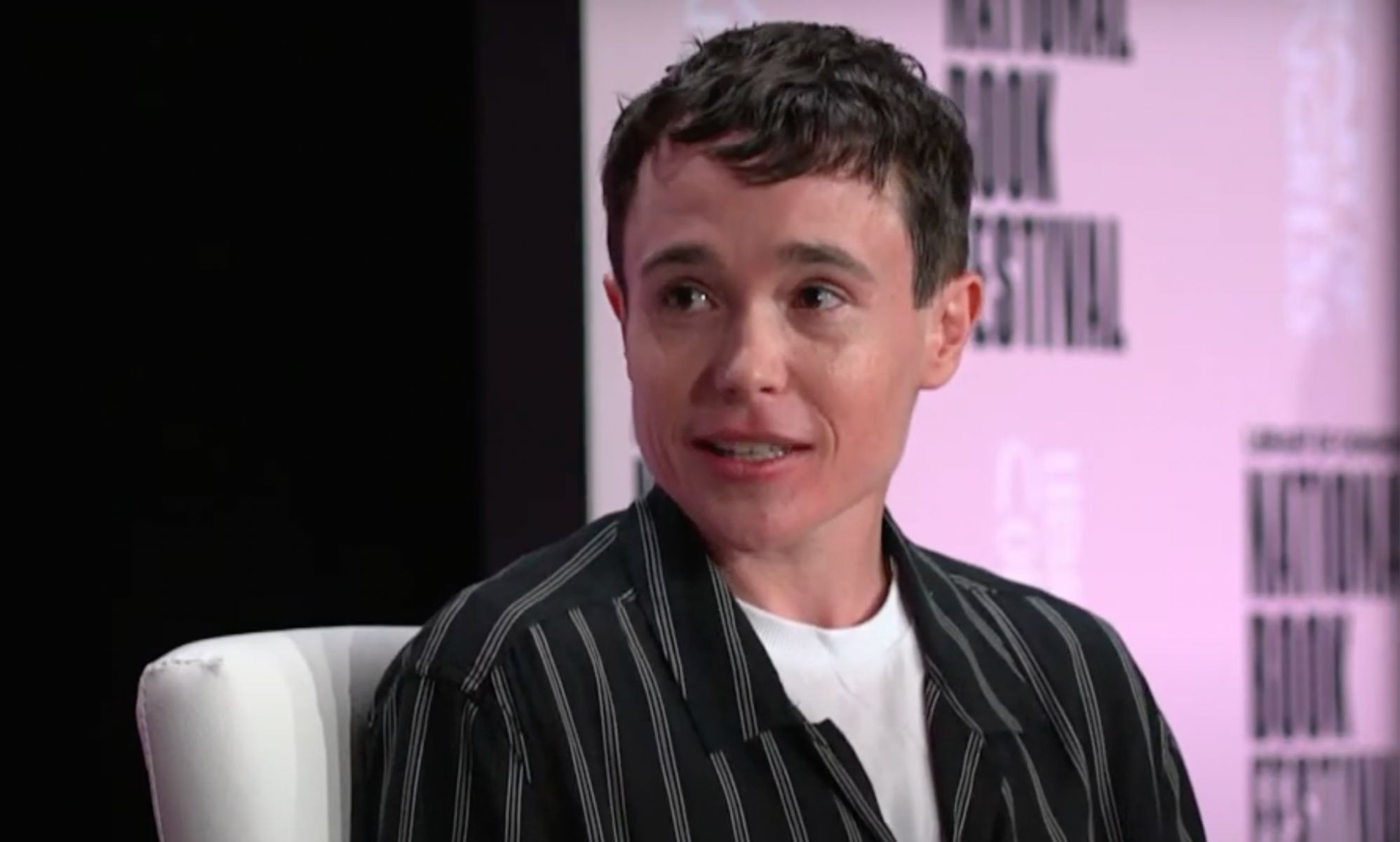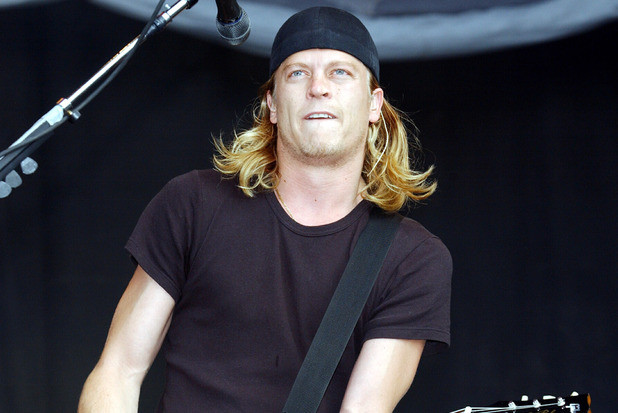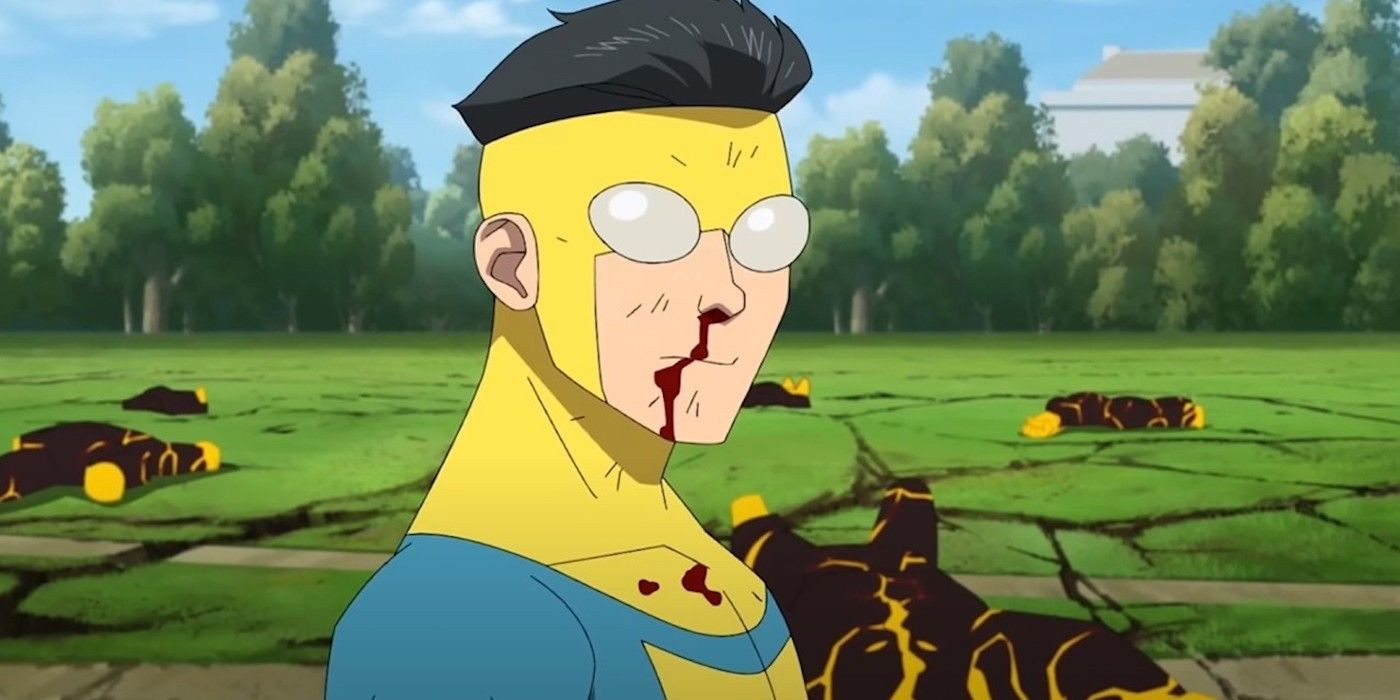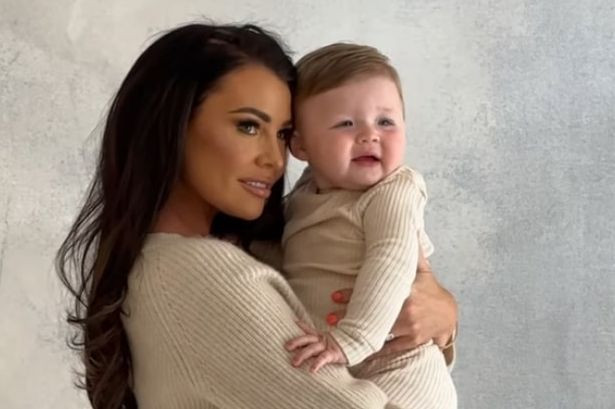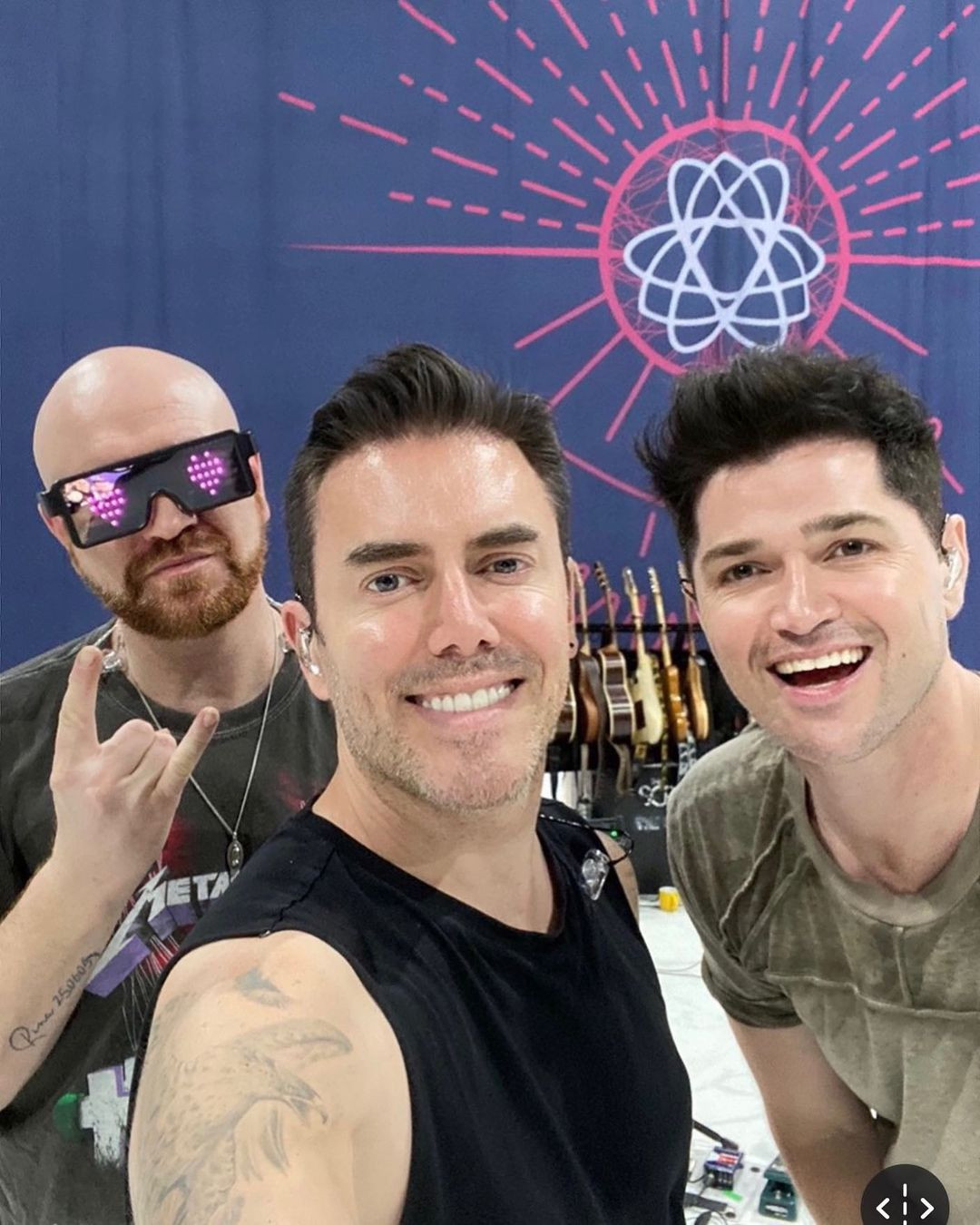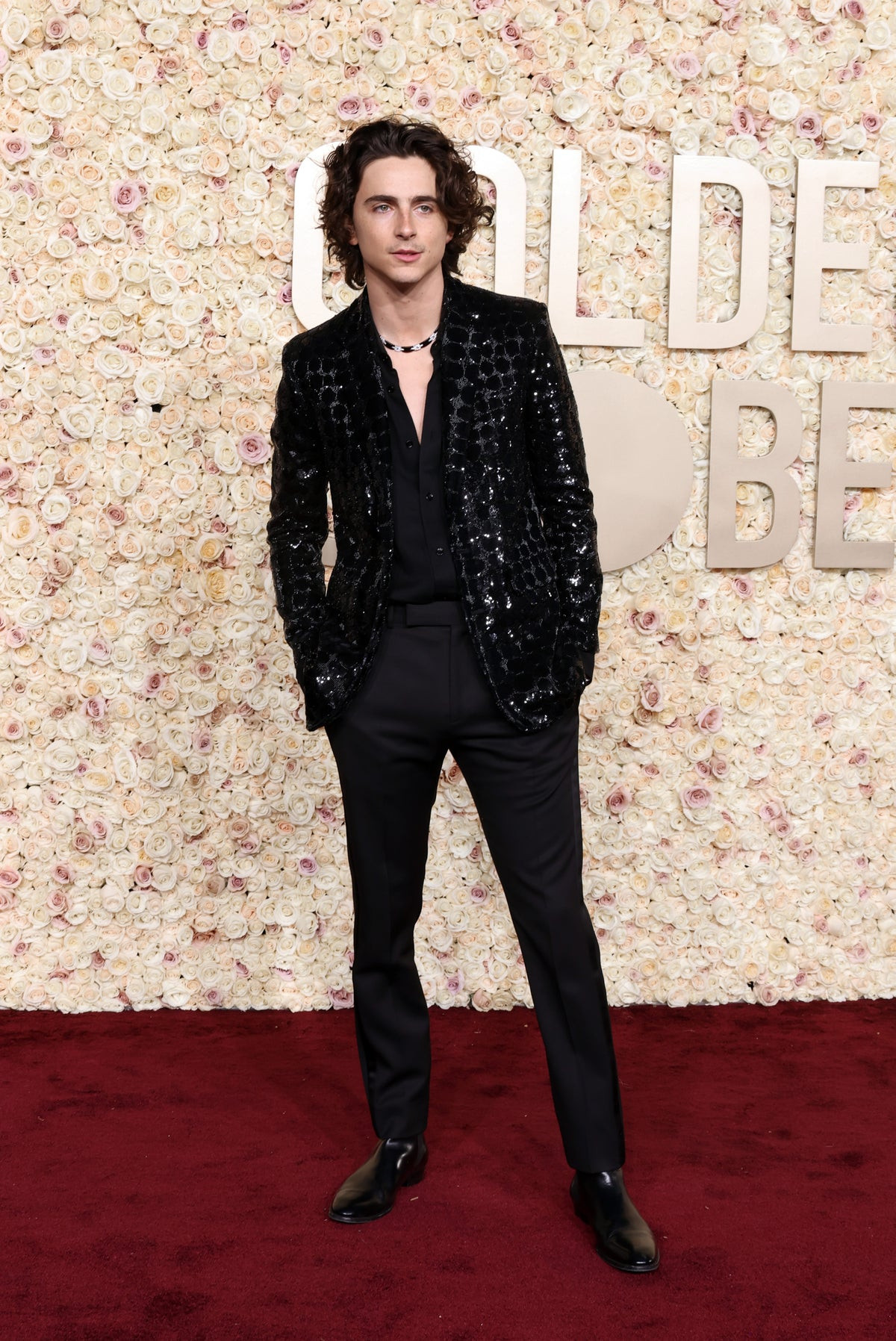Elliot Page has seen two stadium concerts in his life: Neil Young at the Metro Centre in Halifax, Nova Scotia in 2008 and, earlier this year, Megan Thee Stallion’s headlining debut at Madison Square Garden. As the actor and I sit in a quiet corner of the Condé Nast offices, his usual air of calm gives way to unrestrained exuberance, his arms raising to the ceiling as he recounts the electrifying moment when surprise guest Cardi B ascended to the stage for a performance of “Bongos.” He had been hoping she would show up, and when she did, he couldn’t contain his excitement.
“I’m this 37-year-old dude in a stadium, jumping up and down and screaming,” he recalls, painting the scene, “and it felt so nice to be like, ‘Here I am.’”
Sure, age is merely a number and the pleasure of a good concert is universal, but there’s something poignant about Page feeling fully present in that moment at MSG. This was the first show he had seen in the world’s most famous arena, and jumping right alongside him was his close friend, comedian Jes Tom. (“Elliot and I, honestly, we’re bros being bros,” Tom tells me later of their bond.) As a fellow trans guy, I know what it’s like to experience these heightened queer coming-of-age moments when a normal night out is elevated by the fact that you get to experience it now, so fully, as yourself.
In conversation, Page is unfailingly careful with his words. His deliberateness could easily be mistaken for reservation. But the longer he speaks, the more he reveals himself as someone experiencing life with newfound clarity. He is, as he put it, here.
By now, we all know something about how hard it was for Page to arrive at this place. The Canadian-born actor, writer, and producer skyrocketed to A-list stardom with his Oscar-nominated performance in 2007’s Juno, after earning acclaim for his starring turn in the 2005 psychological thriller Hard Candy. He became known for roles that paired the dramatic with the comedic, the heart-wrenching with the hilarious.
Page was playing a balancing act offscreen as well: The actor had to navigate not one, but two very public coming-out moments, first sharing that he was gay in a 2014 speech and then coming out as transgender in an Instagram post amid the COVID-19 lockdowns of 2020. Nearly overnight, Page became “the most famous trans man in the world,” as various major media outlets have anointed him in some form. That designation carries with it pressures I wouldn’t wish on anyone — especially someone so newly out.
The actor says that it was the power of friendship, especially his bond with American Civil Liberties Union attorney and trans activist Chase Strangio, that sustained him amid the flurry of headlines. “Community and trans people who have led the way in creating a world where I can actually exist — I wouldn’t be here without those things,” he tells me, pausing for a moment. “I think I probably would’ve faded away.”
Far from fading, Page has perhaps never been as creatively active as he is now. On August 8, he stars in the fourth and final season of Netflix’s The Umbrella Academy, which enlisted the help of writer Thomas Page McBee last year to shift the narrative of his character, Viktor, to reflect the actor’s transition. He also stars in Dominic Savage’s Close to You, an independent drama premiering August 16 in the U.S. that follows a trans man visiting his hometown for the first time in four years. Not to mention his company Pageboy, which has produced a range of projects since launching in 2021, including a documentary about trans R&B singer Jackie Shane, a VR experience based on historian Hugh Ryan’s When Brooklyn Was Queer, and an adaptation of the popular young adult sci-fi novel The Darkness Outside Us, with more high-profile announcements soon to come.
It’s clear that Page is committed to telling nuanced stories about queer people — and with Close to You, he’s especially reflective about the representation of trans men, whose stories have been comparatively undertold in Hollywood since the so-called “tipping point.” In fact, there are so few films like his newest that he jokes, “We don’t even have something to have a trope in.”
“Give me a trope, I’ll take anything,” he jests.
We both laugh, a little ruefully.
“I guess some people are tired of ‘going home’ ones, aren’t they?” he muses. “And I did just make one of those. But I like going home stories.”
Helmut Lang jacket, Raf Simons tank top, Helmut Lang jeans, and Prada belt courtesy of Artifact NY, Gucci shoes and Cartier chain
Few things compare to seeing Cardi B in person, but making the largely improvised Close to You came, well, close. “For me as an actor, it was absolutely one of the best experiences I’ve had in my career,” he says. “I would make things again in this way, again and again.” The film has an atypical Hollywood origin story, marked by collaboration from the start. During a general meeting between Page and Savage, a story the British director was eager to explore ignited a creative spark. They discussed themes that resonated with them both — family, reconnection, first love — and started shaping the narrative together. The film evolved organically from there.
Shooting it in chronological order, and with nothing but a story outline, over the course of 21 days proved to be one of the most terrifying and exhilarating experiences of the actor’s career, including a legendary 53-minute take. “Can you imagine holding a camera for that long?” Page asks. He springs out of his seat, mimicking the movements of cinematographer Catherine Lutes as she captured massive, emotional scenes in an unorthodox style.
“When we were first starting, I was shitting myself,” he remembers. “Like, what was I thinking? I don’t know how to improvise! How is this even going to work, these big family scenes? I even actually feel little chills right now. I had incredibly emotional experiences. I think all the actors did.”
Close to You marks the first time Page is playing a trans guy who doesn’t have to “come out” in a scene. His character Sam is the odd one out of a heteronormative, ostensibly well-meaning family — a trans man who moved to Toronto four years ago and is now reluctantly returning for his father’s birthday. Along the way, he runs into his old friend Katherine (Hillary Baack) and buried feelings resurface. These scenes of reintroduction are tender, sometimes tense, and loaded with meaning. There are no exhausting 101-level explanations of transness, just people with deep bonds negotiating personal boundaries, toxic family dynamics, and the need for closure.
Thom Browne shirt, trousers, socks, shoes tie, and suit jacket (not pictured), NY Vintage mask (not pictured)
Exploring such heavy themes alongside other actors, all of whom were finding their characters in real time, was as moving as it was fulfilling. Page’s craft, intuition, and talent for experimenting within a scene all make for a shattering performance, his first on the silver screen since coming out as trans. To take on such a high-wire film role after a seven-year hiatus — and after enduring the public scrutiny that inevitably follows when a celebrity dares to share their identity with the world — speaks not just to Page’s bravery, but to his curiosity as an artist.
“What’s so thrilling about [this process] is, you don’t know how it’s going to turn out, and you never do,” he says. “That to me is often what makes the job so beautiful, because unless you are present and enjoying it, then I don’t really know why you’re doing it.”
The actor’s portrayal of Sam is raw and relatable, and the controlled chaos of his sibling and parental dynamics hit close to home. “Sam stands up for himself,” Page says of a pivotal, particularly moving scene in which the character removes himself from an argument and visits Katherine. “[He] knows where he needs to go and be in that moment to feel actually loved, and safe, and cared for.” For many trans viewers, it will be impossible not to have a visceral reaction to a story about an adult returning to a family who claims to be on board with his transition, but who are in a complete spiral around how to treat him. But Close to You also tells a narrative broad enough that all filmgoers can find potential points of entry. “Maybe it is often that when things feel specific, they end up feeling so universal,” Page says of the film. “Because to me it’s a story of a desire to feel truly seen.”
Tom Ford suit jacket and trousers, Gucci shoes
Page has seen the same principle apply to The Umbrella Academy, the massively popular Netflix series in which a family goes on a time-warping journey of self-actualization. “I think what people resonated with the most ultimately is that [Umbrella Academy] is really just about a bunch of siblings in their thirties who are dealing with a really traumatic childhood,” he says of the show’s broad resonance. “[It’s about] how that has manifested and caused a mess in their lives, and how they’ve sometimes caused a mess for the world.”
Viktor’s transition on the screen in season three was presented as a graceful footnote in the character’s arc. In a scene shaped by McBee, Viktor artfully reintroduces himself to his siblings before going back to the superhero action — a moment that made trans viewers everywhere cheer from our sofas over how refreshingly low-key it was.
When I bring up the role coming to an end, Page looks solemn. It can’t be easy to say goodbye to a character he has inhabited for five years. “I guess what I feel about the whole experience honestly is just fucking lucky,” he says. “I got to make something that was really fulfilling as an actor.”
Miu Miu jacket, shirt, trousers, and shoes
When I first met Page in 2015, I was struck by his desire to learn. He was producing the Viceland docuseries Gaycation, a travel show that found him visiting LGBTQ+ people around the world with his friend and co-host Ian Daniel. The series produced several powerful moments, most notably a viral debate with a porkchop-wielding Ted Cruz at the Iowa State Fair; and highlighted the diverse, sometimes harsh realities of queer life. But behind the scenes of that global trek, Page was struggling to find his own people — and himself. “I think of Gaycation in that time and how closeted I was — I really had no community, to be honest,” he shares.
I wish I had known. While making the U.S.A. episode, Page chose to spotlight Original Plumbing, a print publication for trans men I co-founded with Rocco Kayiatos in 2009 that has become an iconic piece of LGBTQ+ history — or at least that’s what my mom tells me. Page invited Kayiatos and me to his home in Los Angeles, where we spread out the archive of OP issues across his dining room table, beefcake models staring up at us in full color. We discussed visibility, the challenges trans men face, and the life-affirming need to create platforms like ours.
“Sometimes I’m like, ‘Oh my God, being trans is such a life hack, because before, I was so miserable. And now you’re like, ‘What? This is great. I don’t mind. This is kind of cool.’ Like, what?!”
At the time, I didn’t realize the depth of Page’s connection to our project. I assumed his interest was simply rooted in his empathy as an activist and storyteller. But it’s impossible to know someone’s inner pain.
Today, I take some comfort in hearing that the scrappy zine I started in my San Francisco bedroom just a few years after I started my own transition played a role in his deeply personal process. “I still have so many copies of Original Plumbing, which I read and learned from,” Page tells me. “Those were probably really significant moments and times for me, actually.”
Stylist's own t-shirt, Hanro boxers, Helmut Lang jeans and Prada belt courtesy of Artifact NY, Cartier chain
After that first meeting, we stayed on each other’s radars, and I eventually joined Gaycation’s second season as a producer. Page continued to support Original Plumbing, even squeezing through the packed LA Art Book Fair crowd to pick up the latest issues. But this was still years before he publicly came out as trans, during a time when his gender dysphoria was overwhelming, unbeknownst to me. “It almost became this thing that I knew and I just kept [thinking] that I’ll figure out a way to get around it,” he says of that time. “I think it was just actually too much — the concept of going through something like that publicly, and then being an actor. My brain was definitely doing what it could to get close, but then weave around.”
My plan for this interview had been to talk about our shared “identity” as little as possible. But whenever two trans guys are locked in a room together, our conversation naturally turns to our experiences, but with a more nuanced vocabulary than we would use elsewhere. We are able to discuss, for instance, how his original 2014 coming-out announcement was a deeply necessary leap that still left him wanting.
“In terms of coming out as gay, that was such a big major step,” he says. “Never would I have gotten the release and the space that would’ve let me get to where I really ultimately needed to be.”
But it was far from a solution to “the thing writhing through my mind and body,” as he evocatively refers to dysphoria in our conversation. He continued to struggle on film sets, but the timing never felt right. And while not all of us are movie stars, many of us know what it’s like to promise ourselves that we’ll come out as trans next month, next year, next decade.
“The dysphoria was so bad, and I would constantly verbalize and think about it, but I still somehow managed to convince myself like, no, no, no,” he says. “Or there’d be that next part to play. For so many people, life keeps going. People don’t get opportunities to necessarily stop and figure out how they actually feel.”
Moments of reflection are vital to Page these days. Now living near several Manhattan parks, he likes nothing more than a long walk with Mo, his poodle-chihuahua with teddy bear eyes. Always in discovery mode, Page experiences New York City as “this endless adventure,” full of “interesting spaces, people living their lives and existing,” he says. Jes Tom, on the other hand, seems more focused on the vast distances they traverse. “We take long, long walks together,” the comedian jokes. “In some ways, we’re kind of like two old men.” Once, on a trip to Lisbon, they averaged 15 miles per day.
Page values quiet time, but he is far from solitary. In the aftermath of his 2020 coming out, he was quick to befriend Chase Strangio, perhaps the most prominent attorney defending trans rights on a national level. One could imagine the lawyer being starstruck by the actor, but Page says that he’s the one who feels fortunate. Strangio “really brought me in and was so caring to me,” Page tells me. “He doesn’t have to do that,” he stresses.
Trans friendship, collaboration, and community have become vital to his daily routines. He is in a group text chat with Strangio and Peppermint, the Broadway performer, singer, and actor who will next appear in the second season of Netflix’s Survival of the Thickest. Page smiles warmly when talking about Peppermint. “We’ve become really close. We do theater dates. We get brunch. She doesn’t live too far from me, so we meet at the diner. And then me, her, and Chase hang out.”
Peppermint appreciates having a private space to vent. “Whenever there’s some wild thing happening in the news or some transphobic thing or some stupid children’s book author says another thing, we’ll just react into the group chat, which is great,” she tells me in a phone call. But it’s not all serious business. “I give him dating advice; he gives me dating advice. I don’t know how good at that either of us are, but we do it,” she adds.
Gucci coat, tank top, trousers, tie, belt, and shoes
Page’s close pals are constantly fielding his treasure trove of media recommendations. Even during our interview, my mind spins as he rattles off names. We touch on music, from Brian Eno to Billie Eilish to Sleater-Kinney and beyond. (“I’ve been listening to this one song, ‘Quiçá’ by LaBaq, over and over and over again. It’s in Portuguese. But I did look up the lyrics. It’s so beautiful. Brazilian.”) Also theater. (“I saw Open Throat at Little Island. It’s from the perspective of that mountain lion that was living under the Hollywood sign.”) And last but certainly not least, books. (“Emily Raboteau, Lessons for Survival,” which he calls “staggeringly beautiful.”)
It’s a lot for his friends to keep up with, and they lovingly have a little fun at his expense. “I’m not a good reader at all,” Tom tells me. “Sometimes I’m like, ‘Oh God, you’re going to tell me to read another book that I know I’m not going to read.’” Peppermint tries to follow Page’s syllabus but “the next time I see him, he’ll be reading a new book and I’ll still be on the same book,” she tells me. “Oh well.”
Jokes aside, Page’s friends praise him as a thoughtful, kind, and genuine companion. “He’s so gracious,” Peppermint says. “And it’s a treat because there’s not a lot of men who operate in grace.”
“I don’t think he’s a person with a really different public persona versus the way that he is in real life,” Tom says. “He’s a real-ass person who’s out there being honest about who he is as he’s figuring it all out.”
For Tom, Page was once an aspirational figure, someone they looked up to as a queer kid dreaming of their own future as a performer. Page was a “kind of archetype,” Tom remembers, for someone in entertainment who was “too weird to fit in.”
Gucci suit jacket, shirt, trousers, tie, gloves, and shoes
“I was queer from a really young age. I came out as gay when I was 13, 14 years old,” Tom says, recalling how their own trajectory through various queer identities has diverged and converged with Page’s over the years. “Over time, Elliot would eventually come out as ‘a lesbian’ and I would be like, ‘Oh yeah, we’re kind of following the same path.’ Then I was nonbinary for a really long time too, from 2011 on. And I would feel a little sad about moving away from what I had perceived as [that] archetype.”
Tom smiles. “Then a few years ago he came out [as trans], too, and I was like, ‘Oh, it turns out we’re all on the same track. We were on the right track this whole time.’”
“He’s a real-ass person who’s out there being honest about who he is as he’s figuring it all out.”
Page gets emotional when discussing the importance of his inner circle, and of trans pioneers like Lou Sullivan and Miss Major who have fought for a future in which he and Tom can have fun playing arcade games in the Times Square Dave & Buster’s. Friendship, he says, “means so much.” He tells me he is looking for specific “moments in time with community and people you can really just let go with.”
When Page is catching a show with Peppermint or casually walking two miles across town to check out a new restaurant with Tom, he says he and his friends can “feel joy with each other and not feel like you have to explain yourself again or something.”
After all, he’s already explained himself enough for one lifetime, probably two.
A-Company shirt and tie, Helmut Lang jeans courtesy of Artifact NY
To use a term popularized by Laverne Cox, Page has been a “possibility model” not just for fellow performers like Tom, but waves of trans people who have come out ever since the 2020 lockdowns forced something of a mass personal reckoning. He means so much to so many. Just look at the three million plus likes, and hundreds of beautifully sincere comments, on his internet-breaking poolside photo from 2021.
But if Page seems like a sponge for art, culture, history, and even my little zine that could, it may be because he’s had to piece together his own blueprint for how to be a trans man in the public eye. A weight has been lifted; now, he’s taking it all in. And while not all of us can break our Fitbits trying to keep up with him on walks to Coney Island, he is giving back to us just as much as he absorbs. His work feels like an outlet for the same boundless curiosity that led him here.
After coming out, he says he “felt such a surge of energy, creativity, inspiration, and true joy in creation,” leading to the 2021 launch of Pageboy Productions, which aims to be a “genre-agnostic” backer of a diverse array of projects, ranging from the queer cheerleading film Backspot to an Italian documentary chronicling the lives of four trans men in their twenties and thirties.
He has also spent more time writing, not just his bestselling 2023 memoir, also named Pageboy, but personal projects that help him find flow. He’ll start first thing after he wakes up. “The feeling I get when I’m in that writing space every morning is probably one of my favorite[s],” he says. “You’re not being perceived by people, you’re not sitting in the hair and makeup trailer in front of a mirror. You are actually the one in control of this thing creatively, and that’s different from what I’m used to.”
Through Pageboy and his other work, he has acquired an interest in artistic endeavors beyond acting, though he’d still be “absolutely stoked” if the perfect part landed on his door. “I think the writing and being behind the scenes has been really good for me, actually, and having a bit of time away from being in front of a camera was nice,” he says.
From a person as understated as Page, simple words like nice or favorite might as well have exclamation marks after them. They speak to an ease with himself — or as he describes it to me, “a certain mental clarity.”
As our conversation winds down, Page leans forward in his chair, a grin flashing on his face. “Sometimes I’m like, ‘Oh my God, being trans is such a life hack, because before, I was so miserable. And now you’re like, ‘What? This is great. I don’t mind. This is kind of cool.’ Like, what?!”
“It doesn’t mean I’m always going to make the best decisions,” he continues, “but I am able to move through the world in what feels like a more present, decisive [way]. I know I’m not being pushed to do something else for someone else’s reason.”
Still searching, Page sits with that statement for a moment before asking me a question of his own: “Do you relate to that?”
Photographer: Lia Clay MillerStylist: Kirby MarzecGroomer: Jenny SauceTailor: Jules PeiperlProducer: Jesse Lackowitz CrozierPhoto Assistant: Sacha PerlsteinStylist Assistant: Blair Cannon
Editor-in-Chief: Sarah BurkeArt Director: Wesley JohnsonTalent Director: Keaton BellSenior Culture Editor: Samantha Allen
Get the best of what’s queer. Sign up for Them’s weekly newsletter here.
Our Story
Contact
© 2024 Condé Nast. All rights reserved. Them may earn a portion of sales from products that are purchased through our site as part of our Affiliate Partnerships with retailers. The material on this site may not be reproduced, distributed, transmitted, cached or otherwise used, except with the prior written permission of Condé Nast. Ad Choices
CN Living




